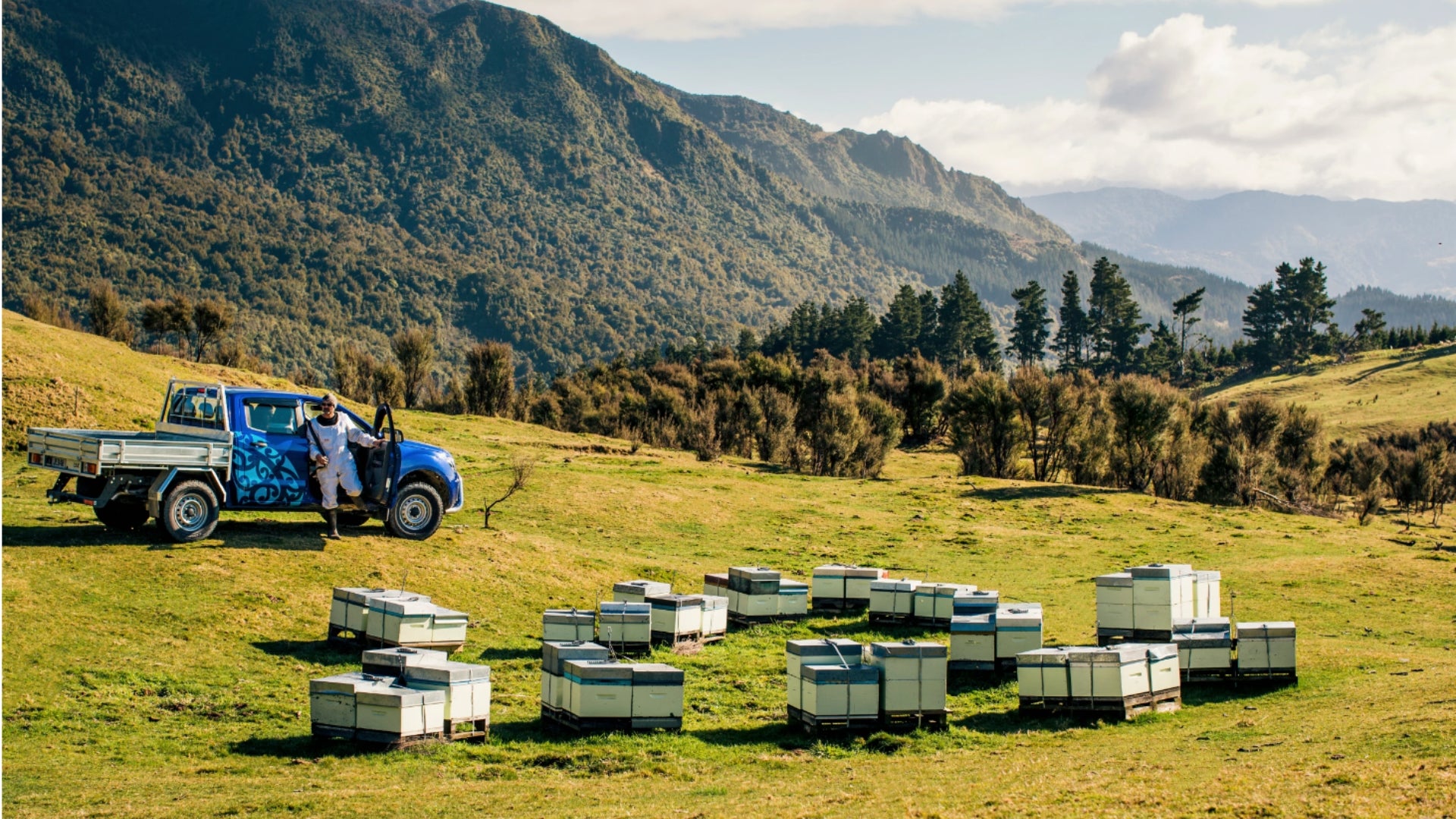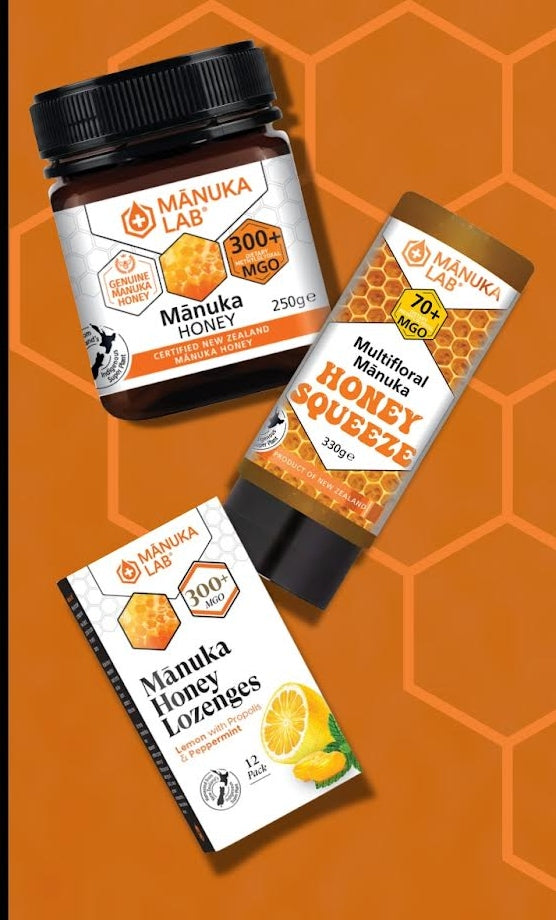

Manuka honey, originating from New Zealand, comes from the nectar of the indigenous manuka bush. Steeped in tradition and backed by scientific research, over the years, manuka honey has captivated global palates and wellness enthusiasts alike.
As we look at what to consider when seeking the best manuka honey, below we have provided a guide - we look at the origins of manuka honey along with the science, the benefits for the body, the environmental aspect and how to choose the best manuka honey. We'll also look at the defining properties like Methylglyoxal (MGO) and the Unique Manuka Factor (UMF) rating system, shedding light on how these elements contribute to manuka's potent antibacterial efficacy.
Exploring the Unique Origins of Manuka Honey
New Zealand is renowned not just for its breathtaking landscapes but also as the birthplace of the world-famous manuka honey. This honey is unique to the country and is derived from the nectar of the manuka bush (Leptospermum scoparium), which is indigenous to this remote corner of the world.
The Manuka Bush and New Zealand's Unique Ecosystem
The robust manuka bush thrives in New Zealand, where it benefits from the nation's moderate temperatures, abundant rain, and extensive sunshine. It is within this ecosystem that the manuka bush blossoms its white flowers, giving bees the opportunity to collect the rare and potent nectar that makes manuka honey so popular.
Historical Context and Traditional Uses in Maori Culture
Manuka honey holds a special place in the history of New Zealand, going back to the age of the Maori people who knew the value of the manuka bush long before honey was harvested. Traditionally, the Maori people used manuka for medicinal purposes, utilising its bark, leaves, and oils to treat various ailments and infections. The knowledge to harness the powerful properties of the manuka plant has been passed down generations and remains a vital part of New Zealand's heritage.
The Science of Manuka: Defining Properties
When evaluating the best manuka honey, understanding its unique properties is essential. At the core of manuka honey's extraordinary benefits lie its singular components that set it apart from traditional honeys.
Understanding Methylglyoxal (MGO) and Its Relevance to Manuka Honey
Methylglyoxal (MGO) is a compound found in high concentrations in manuka honey and is thought to be responsible for its potent antibacterial properties. The presence of MGO in manuka honey is the result of the conversion of another compound, dihydroxyacetone, which is found in the nectar of manuka flowers. This conversion process occurs after the bees have produced the honey, which means that MGO levels can increase over time in properly stored Manuka honey.
Unique Manuka Factor (UMF) Rating and What It Signifies
The Unique Manuka Factor (UMF) is a quality trademark and grading system that appraises natural markers found in manuka honey, such as MGO and another antibacterial component, Leptosperin. The UMF rating measures not just the MGO content, but also how the honey compares to phenol, a disinfectant, in its ability to fight bacteria. A UMF rating of 10 is the minimum recognised level considered to be beneficial for health, with higher UMF ratings signifying an even stronger antibacterial action.
Certification and Standards (UMF, KFactor, BioActive)
Certification and grade standards are crucial when assessing the best manuka honey. Different certifications exist to ensure the purity and quality of manuka honey:
- UMF: As mentioned, it measures not just the MGO content but a combination of natural compounds ensuring both purity and potency.
- KFactor: This is a holistic approach, which takes into account the purity of the honey, live enzymes, pollen count, chemical/residue analysis, antioxidant levels, the raw state of the honey, and other factors that can contribute to the overall quality of the product.
- BioActive: This rating simply indicates the level of antibacterial activity in the honey - the higher the BioActive number, the stronger the antimicrobial action.
Health Benefits of Manuka Honey
The unique composition of manuka honey makes it not just a sweet treat as part of a diet, but also a natural ally in health and wellness. Below, we look at some of the key health benefits this remarkable honey offers, which go far beyond its taste.
Antibacterial Properties
Manuka honey's claim to fame lies in its strong antibacterial properties. This is primarily due to the presence of a compound known as methylglyoxal (MGO), which is particularly effective at combating bacteria. Studies suggest that manuka honey can inhibit the growth of harmful bacteria strains, making it a powerful tool in fighting infections.
Enhancing Wellness
Consuming manuka honey is not just about fighting off infections; it's also about enhancing overall wellness. Its natural components are believed to help support the immune system, providing an added layer of defence against common illnesses. Additionally, due to its anti-inflammatory properties, manuka honey may help in reducing inflammation, thus promoting a state of better health.
Manuka Honey in Medicine
The benefits of manuka honey extend into the medical field as well. It has been used for treating wounds thanks to its wound-healing properties. Applied topically, it can create a protective barrier which not only helps ward off infection but also promotes tissue regeneration. Moreover, for those suffering from a sore throat, manuka honey is often a go-to remedy due to its soothing effect and ability to reduce inflammation.
- Antibacterial Action: Manuka honey is utilised for natural antibacterial treatment, harnessing the power of MGO to target harmful bacteria.
- Immune Support: It is considered an immune booster, potentially complementing your body's natural defences, such as helping ward off colds.
- Wound Care: Used in medical settings for its wound healing properties, manuka honey aids in the repair and sterilisation of minor injuries.
- Sore Throat Relief: With its soothing properties, manuka honey can offer comfort and assist in the recovery from sore throat symptoms, especially in the winter, including a cough.
Discovering the Superfood Qualities of Manuka Honey
Considered one of the most unique and beneficial forms of honey in the world, manuka honey has earned its spot among super foods. Manuka honey's extraordinary nutritional profile and bioactive properties set it apart from ordinary honey, bolstering its status as a superfood.
Criteria That Classify Manuka Honey as a Superfood
What makes manuka honey a superfood? The criteria are stringent, focusing on its nutrient density, health benefits, and the presence of unique compounds not typically found in standard honey:
- Rich in Nutrients: Manuka honey contains essential nutrients such as vitamins, minerals, and antioxidants that contribute to holistic health.
- Unique Manuka Factor (UMF): This quality marker signifies the presence of special antibacterial properties beyond the hydrogen peroxide common in honey.
- High Antioxidant Levels: The higher antioxidant content in manuka honey helps in fighting oxidative stress and promoting overall wellness.
- Antibacterial and Antimicrobial Effects: Manuka honey contains compounds that provide antibacterial and antimicrobial benefits, contributing to its superfood status.
Unlock the Benefits of Manuka Honey for Skin and Beauty
Aside from its well-documented internal health benefits, manuka honey has also carved out a niche for itself in the skincare and beauty industry. This unique honey makes an excellent addition to any external beauty regimen.
Manuka Honey in Skincare and Beauty
Rich with antibacterial and anti-inflammatory properties, manuka honey has become a natural ally in the quest for clear and healthy skin. It helps to combat acne by gently cleansing bacteria from skin pores without stripping the skin of its natural oils. Furthermore, its hydrating qualities make it a natural humectant, drawing moisture into the skin and enhancing skin elasticity.
Manuka Honey: The Environmental Aspect
In the pursuit of harvesting the best manuka honey, it's crucial to consider not only the quality of the product but also the impact its production has on the environment. Sustainable practices in the beekeeping and honey production processes are paramount to ensuring that this natural resource continues to thrive without detriment to the ecosystems it originates from.
Manuka Honey and Sustainability Practices
The production of manuka honey involves a delicate balance of maintaining the health of bees while protecting the native manuka bush and the broader environment. Leading manuka honey producers adopt sustainable methods such as the non-intrusive harvesting of honey, ensuring that bee populations are not stressed or over-exploited.
Furthermore, these producers often engage in active reforestation efforts, planting manuka trees to replenish and expand the natural habitat. This not only secures the future availability of manuka honey but also aids in carbon absorption and the preservation of bio-diversity.
Supporting Eco-Friendly Brands and Ethical Harvesting
Consumers who prioritise the environment can contribute to sustainability by choosing brands that are committed to eco-friendly practices. When searching for the best manuka honey, it's beneficial to look for certifications that indicate responsible harvesting methods and a commitment to environmental stewardship.
- Certification by UMFHA (Unique Manuka Factor Honey Association), which includes a set of standards for sustainable beekeeping and honey production.
- Transparent labeling that provides insight into the honey's traceability and the producer's ecological footprint.
- Commitment to recyclable or biodegradable packaging to minimise waste.
How to Choose the Best Manuka Honey
Finding the best manuka honey among numerous brands can be daunting. The key is understanding what sets high-quality manuka honey apart from its counterparts, some of which has been highlighted above. Whether you're seeking health benefits or simply savouring its unique flavour, here's what to look for when selecting the best manuka honey for your needs.
Comparisons of Different Brands of Manuka Honey
Not all manuka honey is created equal. Various brands offer different quality levels and certifications that may affect the product's potency and price. When comparing options, consider each brand's reliability, consistent quality, and consumer feedback.
What to Look For: UMF, MGO Certification and Brand Reputation
- UMF (Unique Manuka Factor): This quality trademark indicates the presence of unique manuka honey attributes, such as Leptosperin, DHA, and Methylglyoxal. A higher UMF rating suggests a stronger and purer product.
- MGO Certification: The Methylglyoxal level, denoted as MGO, measures the antibacterial strength of the honey. Look for a high MGO number if you're interested in manuka honey for its health benefits.
- Brand Reputation: Reputable brands invest in rigorous testing and quality control. Research and read reviews to gauge a brand's standing and reliability in the market.
Final Thoughts
Manuka honey, sourced from New Zealand's manuka bush, has diverse health benefits. Its therapeutic properties, underpinned by the Unique Manuka Factor (UMF) rating system, make it a luxurious yet powerful addition to a wellness routine. From antibacterial and wound healing properties to support for digestion, immunity, skin, oral health, and allergies, and even as a prebiotic and sweetener substitute (on breakfast meals for example), manuka honey shows its remarkable potential for overall well-being, bridging tradition with modern science.
About Manuka Lab
Manuka Lab are leading expert suppliers of high-quality manuka honey in the UK, including manuka honey skincare products. Our genuine New Zealand manuka honey is sustainably harvested from New Zealand's indigenous 'Super Plant' - this is grown in the remotest areas of the East Cape region, ensuring quality, potency, and origin.
See the full range of manuka honey products on our website. Alternatively, email us at wecare@manukalab.co.uk should you have any questions or require further information regarding our manuka honey products.
Embrace the Natural Elixir - Incorporate Manuka honey into Your Lifestyle.



